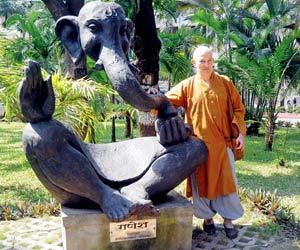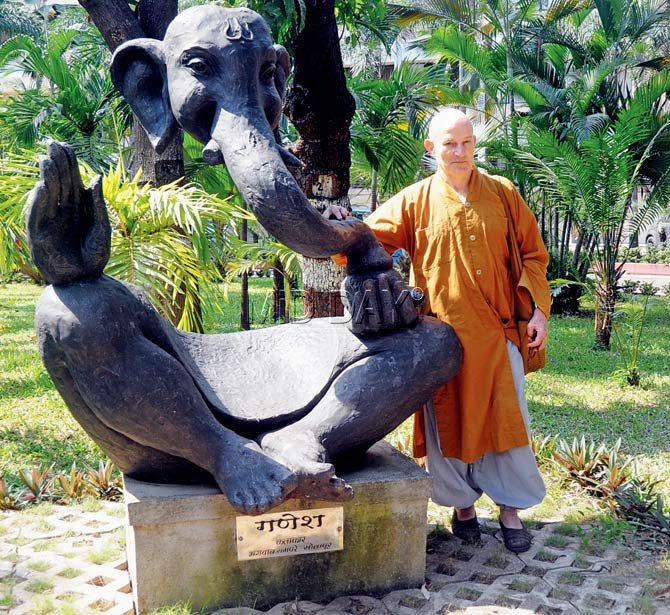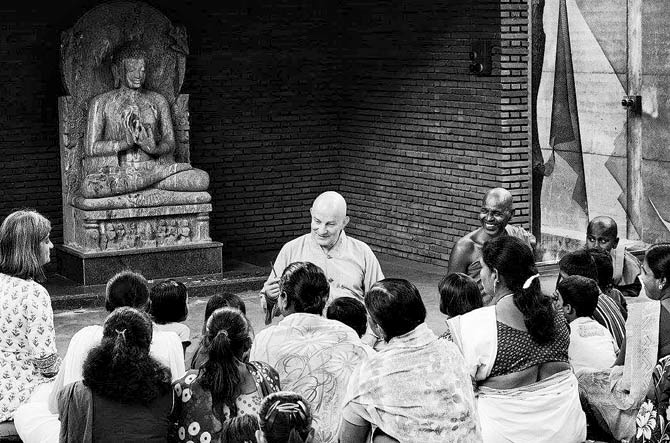On a Mumbai visit, Czech-born meditation master Bhante Dhammadipa discusses adopting the best from Mahayana Buddhism, his weakness for spice, and love for Bachchan

 Meri pitta prakruti hai, isliye teekha bahut priya hai. Spice enthuses me," says Bhante Dhammadipa, 68, in clear Hindi as he looks lovingly at his plate of pithla-bhakri-thecha at Vidyavihar's Aaswad. Next, he will have thalipeeth with loni or white homemade butter.
Meri pitta prakruti hai, isliye teekha bahut priya hai. Spice enthuses me," says Bhante Dhammadipa, 68, in clear Hindi as he looks lovingly at his plate of pithla-bhakri-thecha at Vidyavihar's Aaswad. Next, he will have thalipeeth with loni or white homemade butter.
ADVERTISEMENT
The staff at the Maharashtrian eatery knows the drill. The Buddhist monk, who hails from the Czech Republic, has been a regular at Aaswad since he began teaching at the KJ Somaiya Centre for Buddhist Studies next door, where he introduces a motley bunch to the Mahayana Sraddhotpada Sastra (Awakening of Faith in Mahayana), a synthesis of doctrines of the Mahayana stream of Buddhism which was influential in the development of the faith in east Asia. He says he concentrates on the flexible, inclusive approach of Mahayana practices. "The cultivation of the mind is key to everything. If you train your senses with skillful means, you transcend the cycle of sorrow that shackles you. Mahayana Buddhism teaches you that enlightenment can be achieved during the course of an ordinary life too, and that you need not be an ascetic to reach there," says the monk.

Pic/Sayyed Sameer Abedi
When he isn't at class, Dhammadipa is working on a meditation manual in English that explains the methods of dhyan laid down by Chinese scholar KumÄu00c2u0081rajÄ«va (334–413 CE). It's a tool that he hopes will benefit people across faiths and beliefs. "The Mahayana doctrine says everything is connected. It doesn't matter which part of the Earth we reside in; we are free to pick up threads from any canon if they will bring us inner peace."
Dhammadipa practices what he preaches. He has been accepting of influences all his life, right from his formative years. His ancestors were Jewish, but his parents were Communists. So, religious views were missing from his home. His brush with Buddhism was therefore, accidental. When he immigrated to Berlin as a refugee after the Soviet invasion of then Czechoslovakia, he did not have a place to stay. In search of a shelter, he met Sri Lankan monks and asked to stay at their monastery. While there, he got acquainted with Buddhist texts, and soon, he had found his calling.

Bhante Dhammadipa teaching children at the Jetavan non-sectarian centre for spiritual practice in Sakarwadi, Kopergaon, which he inaugurated two years ago under the aegis of KJ Somaiya Centre for Buddhist Studies
Dhammadipa has studied Chinese literature and philosophy in three milieus: Prague (where he was born as Thomas Peter Gutman), Berlin (to where he immigrated as a refugee after the Soviet invasion) – and later in Paris where he earned a master's degree. In another beautiful cultural cross-connection, he learnt Russian literature at the Hebrew University of Jerusalem. In 1979, his tryst with Indian belief systems began when he enrolled at Bihar's Nalanda University to study Sanskrit and Buddhism, even as he taught French and German.
In 1984, after a degree from Nalanda, he moved to Japan to study under Zen Master Harada Serrei Roshi. A new chapter in his life unfolded in Sri Lanka where he obtained the Theravada Bhiksu ordination and practiced meditation under the guidance of his preceptor Nanarama Mahathera. Dhammadipa holds the title of being the only western disciple under contemporary master Pa Auk Sayadaw (Myanmar) to teach meditation.
After his time in India, he will set off to the Chan forest in Indonesia for an intensive meditation retreat. "I was raised in a socialist state where travel to far-off lands was uncommon and impossible. I think my worldwide travels are my way of clearing the backlog. I have been out for most of my life," he says in jest, adding that after a few months of travelling and teaching anywhere, he feels the need to withdraw. A hermitage in a natural reserve outside Prague is his favourite
getaway.
Dhammadipa's scholastic study goes parallel with intense meditation practice, making him sought-after for his meaningful critique as an insider. He is unafraid to criticise orthodoxy, especially the tendency to stick to set study material. Similarly, he points out that the Mahayanists are prejudiced in their approach to older schools of thought even as their canon does not contain all relevant material. At the core, he is non-sectarian; his lectures are peppered with references from Pali, Sanskrit and Chinese treatises that reflect the almost 1000-year period of development of Buddhist philosophy and practice in India.
Next year, Dhammadipa is scheduled to teach for three months in the US before heading off to Brazil, and it's these diverse audiences that intrigue him. "It is nice to connect with the energies of varied Indians - people from the sylvan hills, the Sakarwadi villagers in mofussil Maharashtra who look at neo-Buddhism as a vehicle of upliftment, and of course, the multi-hued Mumbaikars who start their busy day with missal pav. I love India because it offers so much on my plate," says Dhammadipa. There is a reason behind his special love for the city, where he is posted till the end of the month. "I have lived in central and northern India for long. I have sensed communal tension and gender bias. Makeshift chai shops in Bodhgaya and Nalanda were where I picked up life lessons. I can say with confidence that Mumbai accepts influences more openly."
And then, there is that special Mumbaikar he follows. Amitabh Bachchan. He is often in an auditorium catching a Hindi film, and a game he likes to play is spotting the Urdu or Hindustani words in the dialogues. He enjoyed Secret Superstar, but his favourites include Don, Sholay and Sharaabi. "When I was studying in Bihar, two people were at their peak - Indira Gandhi and Bachchan. I associate India with his image, permanently."
Sumedha Raikar-Mhatre is a culture columnist in search of the sub-text. You can reach her at sumedha.raikar@gmail.com
 Subscribe today by clicking the link and stay updated with the latest news!" Click here!
Subscribe today by clicking the link and stay updated with the latest news!" Click here!






